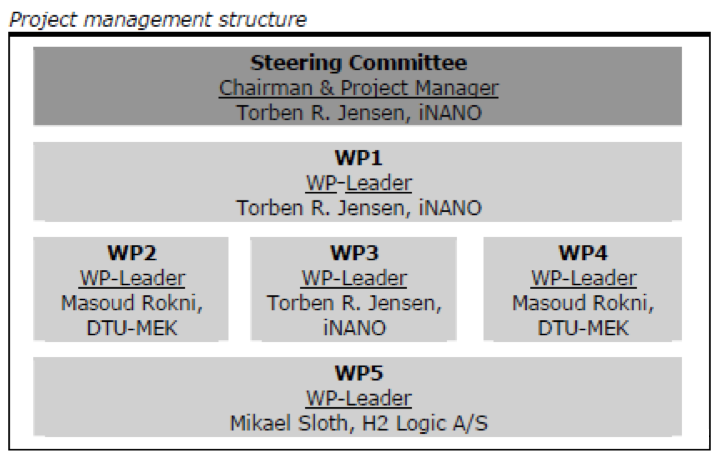| Funded by the Innovation Fund Denmark, the strategic research project 'HyFill-Fast - Fast, efficient and high capacity hydrogen refuelling and on-board storage' was launched in January 2012. This five year project, 1. January 2012 till 31. December 2017, is administrated by Aarhus University. |  |
Hydrogen and fuel cells are internationally recognized as a long term solution enabling the use of renewable energy for mobile applications providing zero particle emission and a carbon neutral transportation system. Unfortunately, safe, energy- and cost-efficient compression, refuelling and on-board storage of hydrogen allowing it to be the successor for gasoline are still lacking. Hydrogen compression is today energy costly, with insufficient capacity and expensive system components. Secondly, no hydrogen storage method has yet been identified, which fulfils all the requirements for mobile applications neither in the gas- (high pressure), liquid- (cryogenic) or solid-state. The goal for this project is to conduct research within a new concept, which integrates compression of hydrogen using an ionic liquid as piston with combined solid state and high pressure on-board hydrogen storage. Ionic liquid gas compression has the potential to increase the capacity and energy efficiency by applying internal cooling during the compression process. Combined high pressure (700 bar) and solid state hydrogen storage clearly has the potential to increase the storage capacity considerably. The great challenge is to engineer the storage tank and the pressure and temperature controlled chemical reactions in such a way that both hydrogen and heat is absorbed, thereby increasing both the energy efficiency and storage capacity. This strategic initiative will conduct outstanding research directed towards specific industrial applications and educate 7 PhD students and 2 postdoc’s at the highest level of mechanical engineering and energy materials science in an international and interdisciplinary research consortium.
iNANO-AU ![]()

Department of Chemistry and Interdisciplinary Nanoscience Center (iNANO), Aarhus University,
Langelandsgade 140, DK-8000 Aarhus C, Denmark. Ph: +45 87155939, (trj@chem.au.dk)
The Interdisciplinary Nanoscience Center (iNANO) was established in 2002 at Aarhus University, with the aim of fostering interdisciplinary research in the area of Nanoscience, based on close collaboration between researchers in physics, chemistry, molecular biology, biology and medicine.
Torben René Jensen, Associate Professor, Ph.D. (trj@chem.au.dk)
Jens-Erik Jørgensen, Associate Professor, Ph.D. (jenserik@chem.au.dk)
H2 Logic A/S 
H2 Logic A/S, Industriparken 34 B, 7400 Herning Denmark
H2 Logic A/S is a leading developer of fuel cell systems and hydrogen refuelling stations (HRS). H2 Logic has since 2003 invested more than €10 million in R&D and installed 15 HRS to date. H2 Logic is one among few companies worldwide offering 70MPa refuelling in according to the SAE J2601 which is required by the major car manufacturers. H2 Logic employees 35 persons compiled of highly qualified research and engineering skills. Further several PhD students are working on R&D topics in collaboration with H2 Logic and various universities. H2 Logic will be responsible for research on the pre-cooling and refuelling system.
Mikael Sloth, Business Dev. Manager (ms@h2logic.com)
Jesper N. Boisen, R&D Manager (jb@h2logic.com)
Leif Kappel Petersen, Mechanical Engineer B.Sc. (lkp@h2logic.com)
DTU-MEK ![]()
![]()
Technical University of Denmark, Department of Mechanical Engineering (DTU-MEK) Nils Koppels Allé, Building 403, DK-2800 Kgs. Lyngby, Denmark
http://www.tes.mek.dtu.dk/English.aspx
DTU Mechanical Engineering (DTU-MEK) is an internationally renowned department at the cutting edge of research and education in mechanical engineering. Research topics include fluid mechanics, solid mechanics, energy technology, maritime and coastal engineering, manufacturing engineering as well as material science and engineering.
Masoud Rokni, Associate Professor, Dr. (mr@mek.dtu.dk)
Brian Elmegaard, Head of Section, Associate Professor, Ph.D. (be@mek.dtu.dk)
HZG 
Helmholtz-Zentrum Geesthacht (HZG) Zentrum für Material- und Küstenforschung GmbH, Max-Planck-Str. 1, 21502 Geesthacht, Germany.
At the Institute of Materials Research at the Helmholtz-Zentrum Geesthacht more than 160 employees work in the 4 divisions of "Material Mechanics", "Materials Physics", "Materials Technology" and "Magnesium Innovation Center MagIC". HZG develops among other ultralight materials based on magnesium for transportation technology, high temperature materials on the basis of Titanium Aluminides e.g. for aviation turbines, and innovative welding processes for air and road transport.
Martin Dornheim, Head of Department, Ph.D. (martin.dornheim@hzg.de)
Personal web page:
https://www.hzg.de/institutes_platforms/materials_research/materials_technology/nanotechnology/staff/047332/index.php.en
José M. Bellosta von Colbe, Deputy Department Leader, Ph.D. (Jose.Bellostavoncolbe@hzg.de)
Personal web page:
https://www.hzg.de/institutes_platforms/materials_research/materials_technology/nanotechnology/staff/047331/index.php.en
KIST 
The Korean Institute of Science and Technology (KIST), Seoul, Republic of Korea
https://kist_school.kist.re.kr/main
KIST is one of the oldest and largest national laboratories in Korea working on advanced research and development of various fields covering from materials to life science as well as system and information technologies. There are more than 420 research scientists and 150 technicians as well as more than 800 Master and PhD students working closely with professors from many top class universities in Seoul. The Materials Science and Technology Division are working on materials on solar cells, secondary batteries, magnetic and semiconductor materials, fuel cells, hydrogen storage materials, and many more advanced functional materials and devices.
Young Whan Cho, Principal Research Scientist, Head of Advanced Functional Materials Research Centre, Ph.D. (oze@kist.re.kr)
Young-Su Lee, Senior Research Scientist, Ph.D. (lee0su@kist.re.kr)
DTU Energy Conversion ![]()
![]()
Technical University of Denmark, Department of Energy Conversion and Storage (DTU Energy Conversion), Kemitorvet, Building 207, DK-2800 Kgs. Lyngby, Denmark
As of January 2012 the Energy and Materials Science Group (previously at Department of Chemistry) is part of the new DTU Institute, Department of Energy Conversion and Storage, where the group constitutes the section Proton Conductors. The Energy and Materials Science Group has expertise in hydrogen and fuel cell research and in the field of molten salts or ionic liquids. The main activity today is high temperature PEM fuel cells and electrolysis. The scientific approach is experimental and key competences of the group comprises inorganic chemistry, materials science, electrochemistry, molten salts/ionic liquids, proton conductive membranes and catalysis.
Jens Oluf Jensen, Associate Professor, Ph.D. (jojen@dtu.dk)
